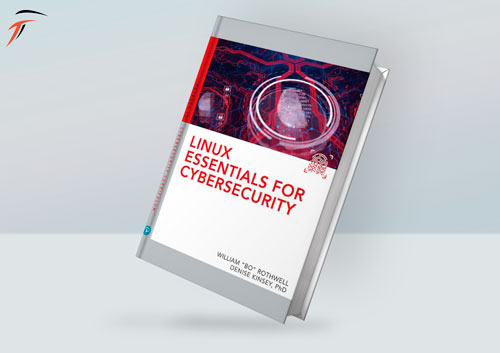معرفی کتاب Linux Essentials For Cybersecurity

با سلام خدمت همراهان همیشگی فرکیان تک. با شما هستیم با کتاب Linux Essentials . این کتاب بر مفاهیم ایجاد امنیت بر مبنای لینوکس تمرکز کرده است.
معرفی کتاب :
Linux Essentials for Cybersecurity با هدف اعمال و عیب یابی امنیت ارائه می شود . با مطالعه کتاب Linux Essentials تمامی مطالب و تکنیک ها مورد نیاز در جهت ایمن کردن سیستم های لینوکس ، شبکه ها ، برنامه ها و داده ها را می آموزید . در این کتاب نصب لینوکس برای دستیابی به امنیت بهینه ، روش های مدیریت ایمن سازی حساب ، سرویس ها ، داده ها ، شبکه ها را انجام میدهد و از ابزار های اسکریپت خودکار برای ردیابی ، تست نفوذ ، تشخیص تهدید استفاده می کنید . در پایان با شرکت در امتحانات + CompTIA Linux و LPIC-1 گواهینامه دوره ها کسب می کنید .
آنچه خواهید آموخت :
بررسی اجزای سیستم عامل لینوکس از نقطه نظر امنیتی
دستورات کلیدی ، ابزارها و مهارتها برای ایمنسازی سیستمهای لینوکس
عیب یابی مشکلات رایج امنیتی لینوکس
محافظت از حساب های کاربر و گروه با Pluggable Authentication
ماژول ها (PAM)، SELinux، گذرواژه ها و خط مشی ها
محافظت از فایل ها و دایرکتوری ها با مجوزها و ویژگی ها
ایجاد دستگاه های ذخیره سازی و مدیریت و محافظت (Both local and network)
زمان بندی به صورت خودکار با نوشتن اسکریپتها ، امنیت سیستم را 24/7 به صورت خودکار تبدیل کنیم
خدمات شبکه را حفظ کنید ، اتصالات شبکه را رمزگذاری کنید، و فرآیندهای قابل دسترسی شبکه را ایمن کنید
بررسی فرآیندهای در حال اجرا و تشخیص تهدید
استفاده از گزارشهای سیستم برای شناسایی آسیبپذیریهای
به روز رسانی لینوکس با ابزارهای مدیریت نرم افزار Red Hat یا Debian
تغییر فرآیند Boot برای تقویت امنیت
جمع آوری اطلاعات سیستم با تکنیک های پیشرفته
این کتاب مناسب چه افرادی می باشد :
برای متخصصان فناوری اطلاعات ، داوطلبانی که به دنبال ایجاد امنیت بر مبنای لینوکس می باشد مناسب است .
براي مشاهده تمامي کتاب هاي زبان اصلي بر روي لينک کليک کنيد .
با ما همراه باشید.
ALL YOU NEED TO KNOW TO SECURE LINUX SYSTEMS, NETWORKS, APPLICATIONS, AND DATA–IN ONE BOOK
From the basics to advanced techniques: no Linux security experience necessary
Realistic examples & step-by-step activities: practice hands-on without costly equipment
The perfect introduction to Linux-based security for all students and IT professionals
Linux distributions are widely used to support mission-critical applications and manage crucial data. But safeguarding modern Linux systems is complex, and many Linux books have inadequate or outdated security coverage.
Linux Essentials for Cybersecurity is your complete solution. Leading Linux certification and security experts William “Bo” Rothwell and Dr. Denise Kinsey introduce Linux with the primary goal of enforcing and troubleshooting security. Their practical approach will help you protect systems, even if one or more layers are penetrated.
First, you’ll learn how to install Linux to achieve optimal security upfront, even if you have no Linux experience. Next, you’ll master best practices for securely administering accounts, devices, services, processes, data, and networks. Then, you’ll master powerful tools and automated scripting techniques for footprinting, penetration testing, threat detection, logging, auditing, software management, and more.
To help you earn certification and demonstrate skills, this guide covers many key topics on CompTIA Linux+ and LPIC-1 exams. Everything is organized clearly and logically for easy understanding, effective classroom use, and rapid on-the-job training.
LEARN HOW TO:
- Review Linux operating system components from the standpoint of security
- Master key commands, tools, and skills for securing Linux systems
- Troubleshoot common Linux security problems, one step at a time
- Protect user and group accounts with Pluggable Authentication
- Modules (PAM), SELinux, passwords, and policies
- Safeguard files and directories with permissions and attributes
- Create, manage, and protect storage devices: both local and networked
- Automate system security 24/7 by writing and scheduling scripts
- Maintain network services, encrypt network connections, and secure network-accessible processes
- Examine which processes are running–and which may represent a threat
- Use system logs to pinpoint potential vulnerabilities
- Keep Linux up-to-date with Red Hat or Debian software management tools
- Modify boot processes to harden security
- Master advanced techniques for gathering system information
